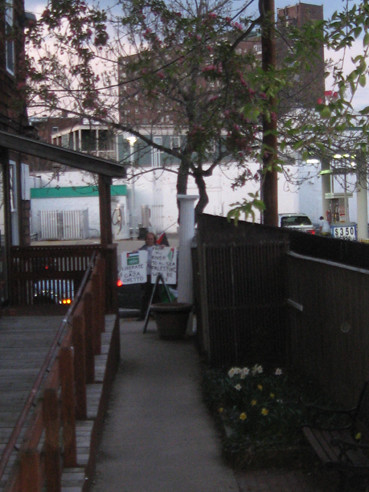Cast of the April 26th reading of Total War at Outpost 186. Note that Anthony DiBartolomeo has been replaced by Stuart G. Levy. The author regrets not taking more photographs.
Despite whatever the lone protester outside of Outpost 186 during the staged reading of Total War was attempting to do, the main event was inside.
Over the previous few days of read-throughs with some of the actors, and conversations with my stage manager, Anika Hannibal-Colvin, certain problems with the current draft became evident. Corrections were often made on the fly and and some notes regarding the next draft were written down. Some of these issues were reaffirmed when I listened to the staged reading with script in one hand and a pen in the other.
Before I engage in some-lengthy self critique, I should note that on the positive end, most of the comedic banter seemed to work, the more poetic florishes were effective, the characters came across as fleshed out, and the audience seemed engaged by the subject matter and storyline, but I had not produced the reading for the purpose of self-congratulation or solicitation of allocades. The purpose was to identify the flaws, and to give direction to the next rewrite.
The Reading:
As I listened, I noted that the second scene of the first act, which had been effective as a piece of written text and would likely work well if staged by a competent director, is dreadfully boring as a purely spoken text. While there are a few good dramatic moments in the scene, but it's basically an info-dump. I still think the play needs the scene, but the scene needs trimming.
The repetitions through the play were not nearly as bad as I feared during the read-throughs, but "not nearly as bad" does not mean "great."
The last scene was somewhat anticlimactic (as I had feared,) and while I am certain a good director could stage it so that it would be more dramatically satisfying, it seemed to me that the director's job is not to make up for the authors' short-comings.
The Talk Back:
Nika took charge during the talk-back, allowing me to take a minimal role in the conversation that followed between the audience and actors. I tried to take whatever notes I could, since the goal was neither to explain nor defend the work, but to listen to others.
Andrew Hicks, amongst the actors, was the most forthright in his criticism of over-reliance on "dialectics" in certain scenes. If I understand correctly that he means philosophical back and forth about epistemology that strays away from the more concrete issues explored by the rest of the play. Jonah, the character Andrew portrayed, certainly should be concerned with epistemology, but for him to go on at length about epistemology without reference to Jewish-Catholic relations or Holocaust denial (the two historical issues the play dwells upon) amounts to a distraction and fails to convey how intertwined Jonah's emotional and intellectual life are. Some of the audience (again, otherwise engaged by other aspects of the story) stated that they felt somewhat alienated in those sections.
A number of other notes from the audience concerned simply placement of scenes, or emotional content of specific scenes. One phenomenon I noticed more than once was that when members of the audience (even in one case, a veteran actor) questioned the emotional tone of certain scenes or relationships between the characters, the actors playing those scenes were quick to defend the emotional aspect. This, I suppose, might a consequence of the very different ways the actors and audience experience the characters.
While some would balk at inviting a critic to attend the reading of a work-in-progress, Thomas Garvey's presence was invaluable during the talk-back. Besides complementing my use of several layers of irony, and his exploration of the less-than-noble qualities of the protagonist, he keenly identified the central conflict arc, and how it failed to advance beyond a certain point, though also pointing out that to fully develop this arc would require a substantial rewrite.
Observations:
The play is not hurt by the research I conducted, but there is such a thing as putting too much of my research into the dialogue. The characters who are motivated by ideology (whether political or theological) were made authentic by the research, but if I made an error, it is that I felt the need to present a logical proof of their authenticity.
Scenes are weighed down by dialectics about historiography, truth in the post-modern era and theology, and a few audience members reported not being able to follow the discussion even if they were engaged by the rest of the story. It's not just a matter of shortening these passages: the lines from these scenes that use more metaphorical or allegorical language are more successful: they convey the emotion and they give the actors and audience more with which to work. After all, Plato's dialogues are rarely performed on stage, and to the extent anyone outside the world of Plato scholarship remembers any part of his ouvre, it's because of a notable allegory or sensual subject matter. Those who enjoy dialectics should be able to extrapolate the argument from the poetry, but for the rest, give them poetry.
I was working with a smart group of actors, but there were several points where I let them down at times by inserting jokes that not only required specialized knowledge to understand (and therefore deliver) but they were further obscured by the fact that the script did not even provide a hint to the actor as to where the could look up the concept being lampooned. (Even from my perspective, they were not the funniest jokes in the play.) Telling the actors (as I did to Andrew Hicks and Tom Sprague during the read-throughs) that "deliver anything that looks like a joke as a joke" simply isn't giving the actors a chance to inhabit the characters.
And now, to begin the rewriting...






